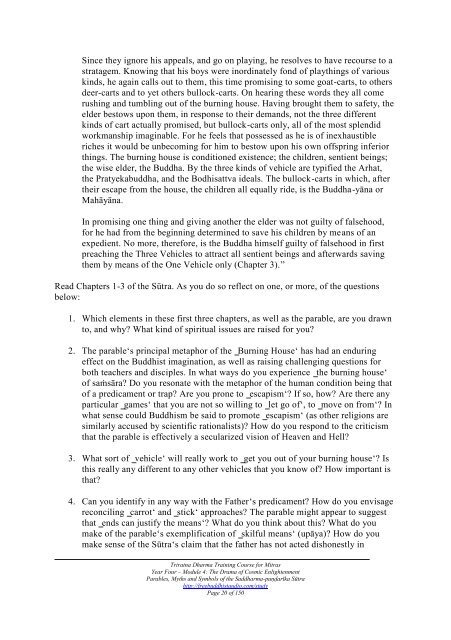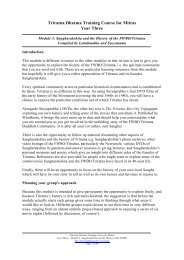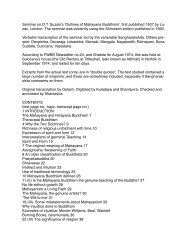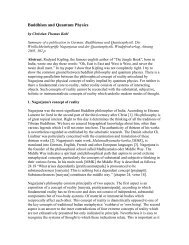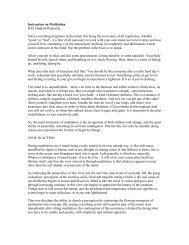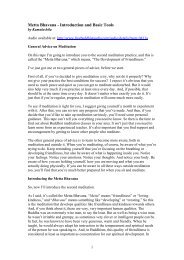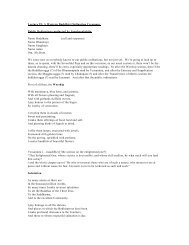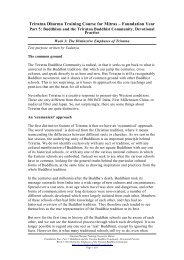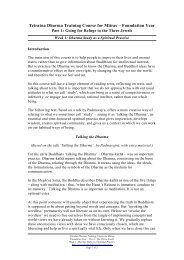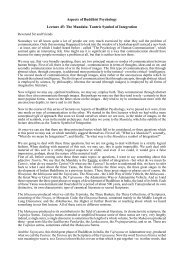The Drama of Cosmic Enlightenment, White Lotus Sutra
The Drama of Cosmic Enlightenment, White Lotus Sutra
The Drama of Cosmic Enlightenment, White Lotus Sutra
Create successful ePaper yourself
Turn your PDF publications into a flip-book with our unique Google optimized e-Paper software.
Since they ignore his appeals, and go on playing, he resolves to have recourse to a<br />
stratagem. Knowing that his boys were inordinately fond <strong>of</strong> playthings <strong>of</strong> various<br />
kinds, he again calls out to them, this time promising to some goat-carts, to others<br />
deer-carts and to yet others bullock-carts. On hearing these words they all come<br />
rushing and tumbling out <strong>of</strong> the burning house. Having brought them to safety, the<br />
elder bestows upon them, in response to their demands, not the three different<br />
kinds <strong>of</strong> cart actually promised, but bullock-carts only, all <strong>of</strong> the most splendid<br />
workmanship imaginable. For he feels that possessed as he is <strong>of</strong> inexhaustible<br />
riches it would be unbecoming for him to bestow upon his own <strong>of</strong>fspring inferior<br />
things. <strong>The</strong> burning house is conditioned existence; the children, sentient beings;<br />
the wise elder, the Buddha. By the three kinds <strong>of</strong> vehicle are typified the Arhat,<br />
the Pratyekabuddha, and the Bodhisattva ideals. <strong>The</strong> bullock-carts in which, after<br />
their escape from the house, the children all equally ride, is the Buddha-yāna or<br />
Mahāyāna.<br />
In promising one thing and giving another the elder was not guilty <strong>of</strong> falsehood,<br />
for he had from the beginning determined to save his children by means <strong>of</strong> an<br />
expedient. No more, therefore, is the Buddha himself guilty <strong>of</strong> falsehood in first<br />
preaching the Three Vehicles to attract all sentient beings and afterwards saving<br />
them by means <strong>of</strong> the One Vehicle only (Chapter 3).‖<br />
Read Chapters 1-3 <strong>of</strong> the Sūtra. As you do so reflect on one, or more, <strong>of</strong> the questions<br />
below:<br />
1. Which elements in these first three chapters, as well as the parable, are you drawn<br />
to, and why? What kind <strong>of</strong> spiritual issues are raised for you?<br />
2. <strong>The</strong> parable‘s principal metaphor <strong>of</strong> the ‗Burning House‘ has had an enduring<br />
effect on the Buddhist imagination, as well as raising challenging questions for<br />
both teachers and disciples. In what ways do you experience ‗the burning house‘<br />
<strong>of</strong> saṁsāra? Do you resonate with the metaphor <strong>of</strong> the human condition being that<br />
<strong>of</strong> a predicament or trap? Are you prone to ‗escapism‘? If so, how? Are there any<br />
particular ‗games‘ that you are not so willing to ‗let go <strong>of</strong>‘, to ‗move on from‘? In<br />
what sense could Buddhism be said to promote ‗escapism‘ (as other religions are<br />
similarly accused by scientific rationalists)? How do you respond to the criticism<br />
that the parable is effectively a secularized vision <strong>of</strong> Heaven and Hell?<br />
3. What sort <strong>of</strong> ‗vehicle‘ will really work to ‗get you out <strong>of</strong> your burning house‘? Is<br />
this really any different to any other vehicles that you know <strong>of</strong>? How important is<br />
that?<br />
4. Can you identify in any way with the Father‘s predicament? How do you envisage<br />
reconciling ‗carrot‘ and ‗stick‘ approaches? <strong>The</strong> parable might appear to suggest<br />
that ‗ends can justify the means‘? What do you think about this? What do you<br />
make <strong>of</strong> the parable‘s exemplification <strong>of</strong> ‗skilful means‘ (upāya)? How do you<br />
make sense <strong>of</strong> the Sūtra‘s claim that the father has not acted dishonestly in<br />
Triratna Dharma Training Course for Mitras<br />
Year Four – Module 4: <strong>The</strong> <strong>Drama</strong> <strong>of</strong> <strong>Cosmic</strong> <strong>Enlightenment</strong><br />
Parables, Myths and Symbols <strong>of</strong> the Saddharma-puṇḍarīka Sūtra<br />
http://freebuddhistaudio.com/study<br />
Page 20 <strong>of</strong> 150


